The Truth About Option Premium: Stock Price vs. IV

The Truth About Option Premium: Stock Price vs. IV
By:Kai Zeng
Implied volatility is often more critical to option prices than the volatility of the underlying stock prices
Option sellers are constantly on the hunt for strategies that allow them to capitalize on higher premiums. A fundamental understanding of how the price of the underlying asset and implied volatility (IV) influence option values is crucial for traders who sell naked options.
For instance, let's consider the S&P 500 ETF Trust (SPY). With IV held constant at 20%, a $100 increase in the SPY can lead to a 24% rise in the option's price. This demonstrates the significant impact that movements in the underlying asset's price can have on option premiums.
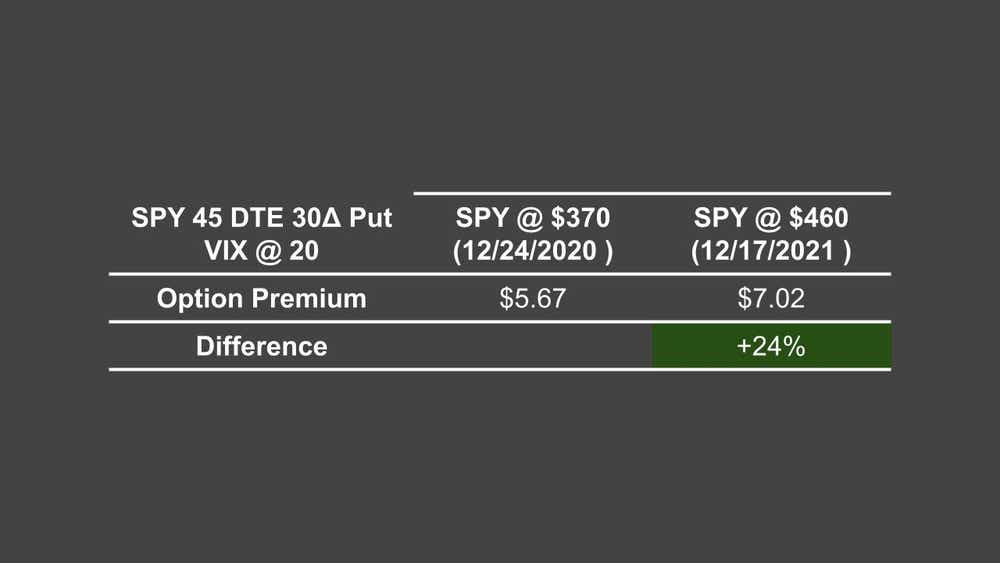
However, when we shift our focus to IV, the effect appears to be even more pronounced. Keeping SPY's price constant, a 10-point increase in SPY's IV could cause the option's price to surge by 32%. This highlights the sensitivity of option prices to fluctuations in IV and underscores the potential for IV to play a more dominant role than even substantial price movements in the underlying asset.
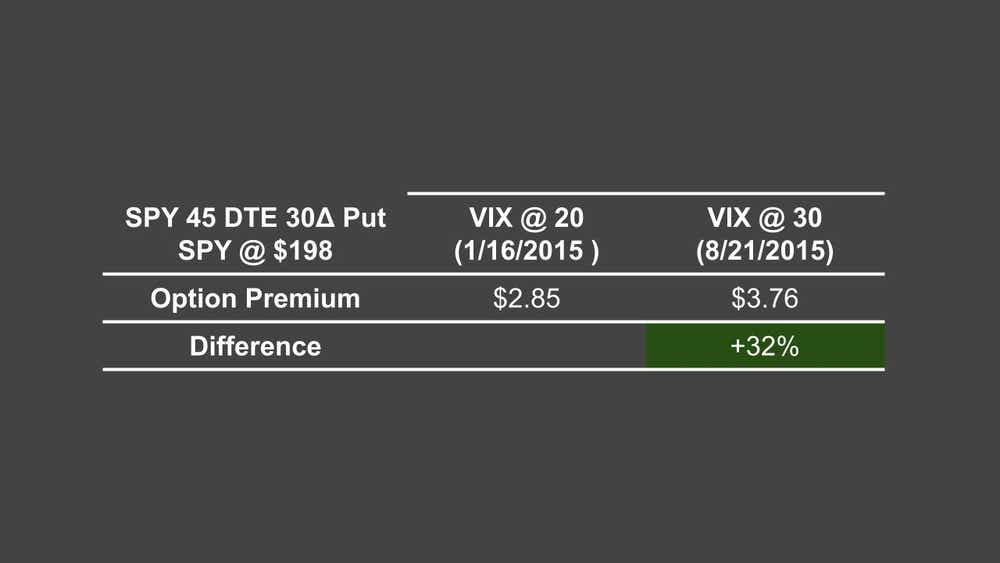
The relationship between price changes, IV, and option premiums extends to risk-defined strategies like put/call spreads and iron condors with fixed wings. For example, in a test conducted with a 45-day-to-expiration (DTE) SPY put spread, by selling 20-delta puts with $5 and $10 widths, the findings were informative. An increase in IV or a rise in the stock price resulted in a minimal change in option premium for a relatively narrower spread like $5-wide spread.
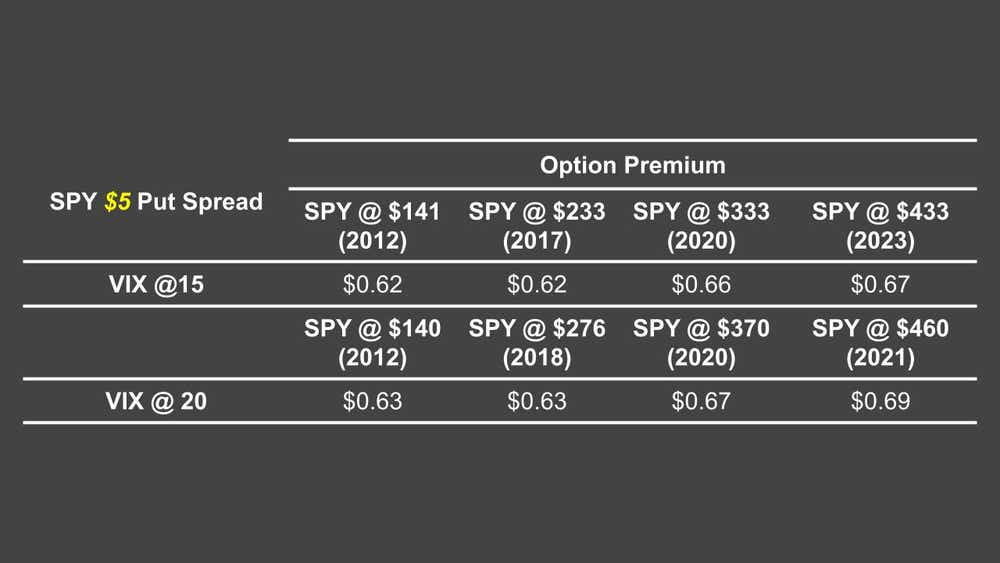
In contrast, the increase in premiums for $10 wide spreads was more significant as stock prices and IV levels increased. But the impact remained relatively modest at approximately 15% for every $100 movement in stock price.
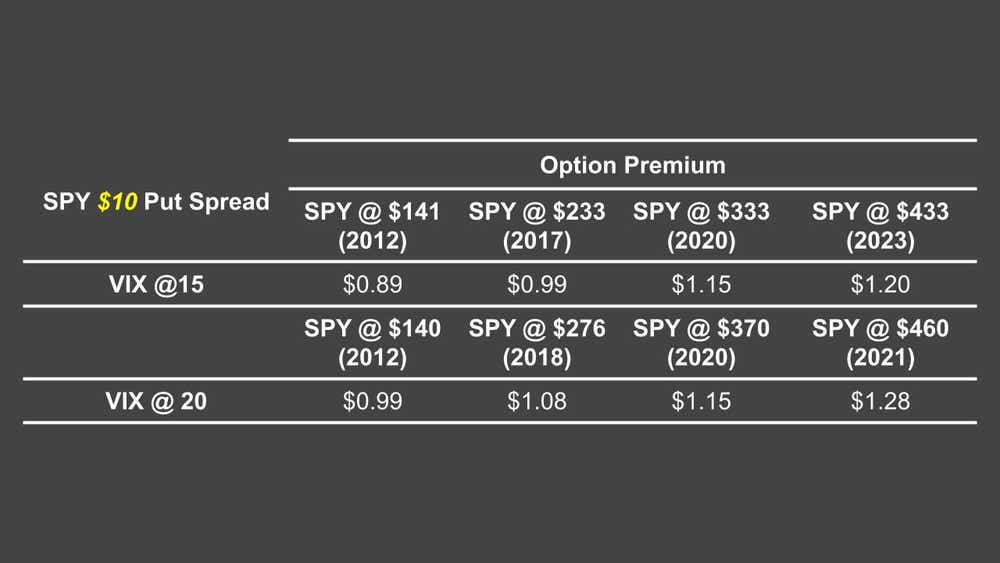
While a $100 change in underlying price may not occur frequently, implied volatility can jump by 10% in a single day in the event of a significant drop in the underlying price.
For instance, in the case of SPY, a 10% increase in VIX could lead to a 22% increase in the premium for a $10 wide put spread - a much larger impact than the change in underlying price alone.
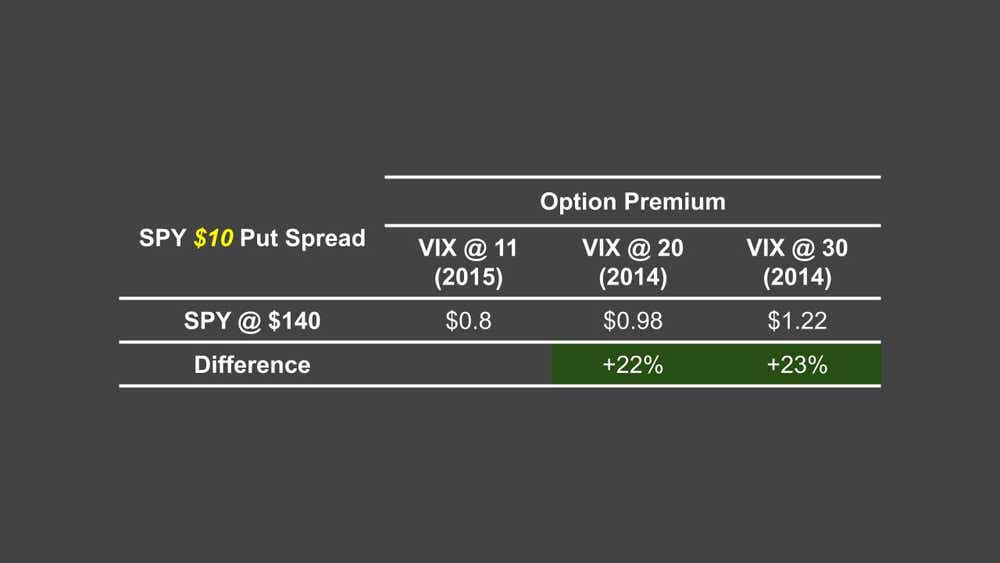
The takeaway for traders is multifaceted.
First, increases in the underlying price and IV typically lead to an increase in the premium of static spreads. Second, the impact of changes in stock price or IV is more pronounced on wider spreads. Lastly, and perhaps most importantly, IV's inherent volatility often makes it a more critical factor in affecting option prices than the volatility of the underlying stock price.
Kai Zeng, director of the research team and head of Chinese content at tastylive, has 20 years of experience in markets and derivatives trading. He cohosts several live shows, including From Theory to Practice and Building Blocks. @kai_zeng1
For live daily programming, market news and commentary, visit tastylive or the YouTube channels tastylive (for options traders), and tastyliveTrending for stocks, futures, forex & macro.
Trade with a better broker, open a tastytrade account today. tastylive, Inc. and tastytrade, Inc. are separate but affiliated companies.
Options involve risk and are not suitable for all investors. Please read Characteristics and Risks of Standardized Options before deciding to invest in options.
tastylive content is created, produced, and provided solely by tastylive, Inc. (“tastylive”) and is for informational and educational purposes only. It is not, nor is it intended to be, trading or investment advice or a recommendation that any security, futures contract, digital asset, other product, transaction, or investment strategy is suitable for any person. Trading securities, futures products, and digital assets involve risk and may result in a loss greater than the original amount invested. tastylive, through its content, financial programming or otherwise, does not provide investment or financial advice or make investment recommendations. Investment information provided may not be appropriate for all investors and is provided without respect to individual investor financial sophistication, financial situation, investing time horizon or risk tolerance. tastylive is not in the business of transacting securities trades, nor does it direct client commodity accounts or give commodity trading advice tailored to any particular client’s situation or investment objectives. Supporting documentation for any claims (including claims made on behalf of options programs), comparisons, statistics, or other technical data, if applicable, will be supplied upon request. tastylive is not a licensed financial adviser, registered investment adviser, or a registered broker-dealer. Options, futures, and futures options are not suitable for all investors. Prior to trading securities, options, futures, or futures options, please read the applicable risk disclosures, including, but not limited to, the Characteristics and Risks of Standardized Options Disclosure and the Futures and Exchange-Traded Options Risk Disclosure found on tastytrade.com/disclosures.
tastytrade, Inc. ("tastytrade”) is a registered broker-dealer and member of FINRA, NFA, and SIPC. tastytrade was previously known as tastyworks, Inc. (“tastyworks”). tastytrade offers self-directed brokerage accounts to its customers. tastytrade does not give financial or trading advice, nor does it make investment recommendations. You alone are responsible for making your investment and trading decisions and for evaluating the merits and risks associated with the use of tastytrade’s systems, services or products. tastytrade is a wholly-owned subsidiary of tastylive, Inc.
tastytrade has entered into a Marketing Agreement with tastylive (“Marketing Agent”) whereby tastytrade pays compensation to Marketing Agent to recommend tastytrade’s brokerage services. The existence of this Marketing Agreement should not be deemed as an endorsement or recommendation of Marketing Agent by tastytrade. tastytrade and Marketing Agent are separate entities with their own products and services. tastylive is the parent company of tastytrade.
tastyfx, LLC (“tastyfx”) is a Commodity Futures Trading Commission (“CFTC”) registered Retail Foreign Exchange Dealer (RFED) and Introducing Broker (IB) and Forex Dealer Member (FDM) of the National Futures Association (“NFA”) (NFA ID 0509630). Leveraged trading in foreign currency or off-exchange products on margin carries significant risk and may not be suitable for all investors. We advise you to carefully consider whether trading is appropriate for you based on your personal circumstances as you may lose more than you invest.
tastycrypto is provided solely by tasty Software Solutions, LLC. tasty Software Solutions, LLC is a separate but affiliate company of tastylive, Inc. Neither tastylive nor any of its affiliates are responsible for the products or services provided by tasty Software Solutions, LLC. Cryptocurrency trading is not suitable for all investors due to the number of risks involved. The value of any cryptocurrency, including digital assets pegged to fiat currency, commodities, or any other asset, may go to zero.
© copyright 2013 - 2026 tastylive, Inc. All Rights Reserved. Applicable portions of the Terms of Use on tastylive.com apply. Reproduction, adaptation, distribution, public display, exhibition for profit, or storage in any electronic storage media in whole or in part is prohibited under penalty of law, provided that you may download tastylive’s podcasts as necessary to view for personal use. tastylive was previously known as tastytrade, Inc. tastylive is a trademark/servicemark owned by tastylive, Inc.
Your privacy choices